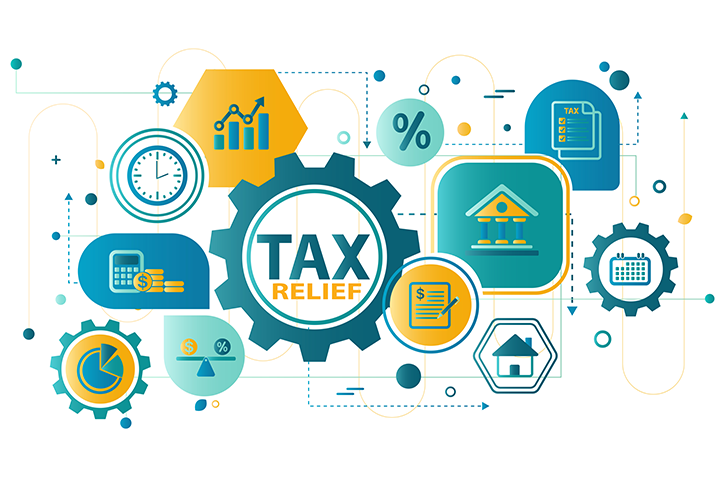Permanent Tax Relief, Practical Impact

The tax provisions contained in the recently passed reconciliation bill give food equipment distributors new momentum and room to grow.
By Bridget McCrea
Contributing Writer
When the One Big Beautiful Bill Act (OBBBA) officially became law in July, Huff Harper finally exhaled. That’s because the president of Oswalt Restaurant Supply knew the budget reconciliation legislation wasn’t just another bill; it was the green light to keep moving forward. The company had developed a strategy that factored in the 2017 tax cuts and used the added margin to boost salaries, invest in equipment and support the surrounding community.
Had those provisions expired — something that was slated to happen at the end of this year — Harper was prepared to scale back. “We were making bold decisions like significantly raising salaries, upgrading equipment and aggressively reinvesting in the business because we could,” Harper said. “But if the cuts went away, we’d have had to reverse course. That’s not something you can do without consequences.”
For Harper, permanence also means predictability. It gives Oswalt Restaurant Supply’s leadership team room to plan, invest and grow without wondering whether the rules will change midstream. “Your team and your community get used to a certain level of support,” Harper explained. “Once you commit, it’s hard to explain why you’re backing off, especially when the only reason is that tax policy is shifting under your feet.”
Removing the Guesswork
Harper isn’t alone. For dealers and manufacturers alike, the OBBBA delivers something the business community hasn’t had in years: tax certainty. By locking in key tax provisions from the 2017 Tax Cuts and Jobs Act, such as full equipment expensing, lower long-term rates and enhanced credits for investment, the bill removes the guesswork from planning and puts long-term growth potential back on the table.
Featuring permanent incentives for capital improvements, expanded opportunity zones and immediate deductions for U.S.-made assets, the OBBBA effectively rewards organizations that build, buy and hire domestically. While tariffs, high interest rates, the rising national debt, and persistent labor shortages remain key concerns for many companies right now, the bill’s business-focused provisions may make it easier for FEDA members to pursue long-term investments.
The clarity that the bill provides is already having an impact. For example, Harper says his team is now exploring investments they once considered out of reach, including equipment upgrades and longer-range planning. “Removing the sunset gives us the confidence to make those decisions without second-guessing whether or not we’ll have to pull back next year,” he says. “We’re no longer asking ‘what if?’ We’re moving forward.”
What Is the OBBBA?
At a hefty 870 pages, the OBBBA includes a wide array of provisions and covers a lot of ground. Some of the most significant benefits in the legislation are related to its deductions. The act locks in 100 percent bonus depreciation, increases Section 179 expensing limits for smaller firms and raises the qualified business income deduction for pass-through entities.
For foodservice equipment and supplies dealers that may have been holding off on equipment purchases or expansion plans due to tax uncertainty, this bill clears the path forward. The bill also includes several worker-focused benefits: It eliminates federal income tax on tips and overtime through 2028, raises the standard deduction and leaves Social Security benefits untaxed.
The act is expansive, but some of the key business- and employee-related provisions include:
- Incentivizes Made-in-America Manufacturing: Full 100 percent expensing for new factories, equipment and machinery for domestic production.
- Expands Opportunity Zones: Permanently renews and strengthens programs, unlocking $100 billion of investment and one million jobs for rural and distressed communities.
- Doubles Small Business Expensing: Raises the limit for small businesses to immediately deduct up to $2.5 million in equipment and property costs.
- Makes the Small Business Tax Deduction Permanent: Preserves the Section 199A small business deduction, which the White House says will “generate $750 billion in economic growth and create over 1 million jobs.”
- Preserves LIFO: Prevented efforts to eliminate or retroactively tax the last-in, first-out (LIFO) accounting method used by many distributors.
- Eliminates Taxes on Overtime and Tips: Saves overtime and tipped workers nearly $1,500 annually.
- Increases Paycheck Size: Boosts take-home pay for a typical family by more than $10,000 a year.
While most provisions in the OBBBA apply to tax years beginning after Dec. 31, 2025, many key changes take effect immediately, and some apply retroactively, such as those tied to transactions that happen after mid-June 2025. For businesses, this means certain deductions and incentives, particularly those related to capital investments and U.S.-made assets, are already in play.
On the labor side, the OBBBA introduces four new tax deductions for 2025 through 2028 that directly affect employees and indirectly benefit the businesses that employ them. The one that may most assist employees of FEDA members is the overtime pay deduction. This provision allows employees to deduct the overtime premium portion of their pay (essentially, the extra half from time-and-a-half). The cap is $12,500 for individuals, $25,000 for joint filers, and it phases out for higher-income taxpayers.
Although it may not change payroll for dealers, the overtime deduction could help boost retention and take-home pay, particularly for hourly workers and anyone who is working in a service-based role.
Distributors Applaud Passage
As the vice president of government relations for the National Association of Wholesaler-Distributors (NAW), Alex Hendrie has kept a finger on the pulse of OBBBA since conversations about the act started in early 2024. Since then, he’s been tracking its progress, weighing its implications and helping distributors understand what it means for their businesses.
“We’ve been working on this for years and we couldn’t have hoped for a better outcome,” Hendrie said. “A number of individual and business tax provisions had either expired or were set to expire, and there was also the risk of harmful tax increases. We got permanency on all the key things and also avoided many of the tax offsets that were being floated.”
In addition to extending and preserving critical tax breaks, the OBBBA introduces several new incentives that could directly benefit the wholesale distribution sector. Among them are a tax deduction tied to U.S.-based factories and warehouses and no federal income tax on overtime pay. “Not only did we prevent a tax increase on a lot of businesses and workers,” Hendrie says, “but we also have these new opportunities for the industry.”
So far, NAW members have responded positively to the act’s passage. Many of them are structured as S corporations and may benefit from the now permanent 199A deduction. Others are enthused about the provisions related to bonus depreciation and research and development. “There’s a lot of happiness around the certainty that the OBBBA delivers,” Hendrie said. “We’re hearing a lot of excitement and fielding a lot of questions. It’s a big bill with a lot of moving parts, and members are trying to make sure they’re reading it right.”
While the tax priorities are now largely resolved, Hendrie said other business issues remain top of mind, including tariffs and workforce challenges. He also flagged additional OBBBA provisions related to paid leave, Pell Grants and healthcare that could impact employers. “It’s a massive bill,” he says, “and while taxes are a core focus, there’s still more in there that’s worth exploring.”
Exploring the Possibilities
For Brian Reardon, president of the S Corporation Association, the passage of the OBBBA wasn’t just a win. It was a massive relief. “If Congress had done nothing, there may have been a $4 trillion tax hike,” he pointed out. Pass-through businesses like S corporations and LLCs were facing the loss of key provisions from the 2017 Tax Cuts and Jobs Act, including lower rates, the Section 199A deduction and a higher estate tax exemption.
The OBBBA now allows those businesses to plan ahead without fearing a sudden spike in their tax bill. The act also helped restore parity between pass-throughs and C corporations at a time when the tax code would have pushed more family businesses into becoming C corporations. “Forcing family businesses into the C corp structure would have hurt their ability to compete,” Reardon said, noting that the OBBBA ensures that pass-throughs aren’t penalized simply for choosing a more flexible, privately held corporate structure.
Another important, though less publicized, victory for businesses in the reconciliation bill was the protection of state and local tax (SALT) parity, Reardon said. This refers to state and local taxes that are typically capped at $10,000 for individual filers under federal law. However, many states have adopted an entity-level tax election that allows pass-through businesses — such as S corporations and partnerships — to deduct those taxes at the business level instead of the individual level.
For small and midsized business owners in high-tax states such as California and New York, keeping the entity-level SALT deduction in place means they can continue to offset steep state tax bills. Without this provision, many of them would have faced higher federal tax burdens. “That equates to roughly $20 billion in savings for pass-through entities,” Reardon explained.
Benefits Clouded by Tariff Uncertainty
From the manufacturer’s perspective, John Haselbarth, CFO, and Brian Kelly, president at National Refrigeration and A/C Products, Inc. (NRAC), said the tax bill is a mixed bag. On one hand, they welcome the tax provisions that help manufacturers invest and grow. But those positives are being offset by persistent tariffs, regulatory complexity and workforce shortages that continue to weigh heavily on manufacturers’ operations.
“The tax rate changes and the ability to expense capital purchases more quickly are positives,” Haselbarth said. “However, a lot of those gains are canceled out by tariffs and other external pressures. That’s the frustrating part.”
Still, the permanent nature of the tax relief provisions is seen as a key advantage. Had the 2017 cuts expired, Kelly said it would have hurt manufacturing further and forced NRAC, the parent company of Continental Refrigerator, to reassess planned investments. With permanence comes a dose of stability that’s helping the company move ahead with equipment upgrades and smaller capital purchases that had been sitting on the fence. “It may not shift the needle on our biggest purchases,” Haselbarth said, “but it will help us with our overall investments.”
A Powerful Tool for Business Growth
Although other factors may be softening business conditions, the tax provisions of the reconciliation bill have the potential to be a powerful tool for business growth immediately and in the years ahead. Foodservice equipment dealers like KaTom Restaurant Supply are eager to use the tax savings to put more cash back into the business for equipment upgrades, employee development, strategic expansion, and other initiatives without having to second-guess the future.
“The tax savings aids equipment capital expenditure, dramatically moving the timeline up with investment purchases,” Patricia Bible, president and CEO of KaTom, said. “It allows us to accelerate our growth strategy, strengthen our infrastructure and continue investing in the tools and technology that empower our team and serve our customers at the highest level.”
Looking beyond taxes, Bible said the higher child and dependent care tax credit can help with talent retention while permanent incentives for capital improvements level the playing field for midsized distributors. Combined, these benefits support modernization, improve cash flow and enhance the ability to compete in an industry sector where low margins are the norm. With so many components designed to support businesses, Bible said now is a great time for FEDA members to familiarize themselves with the long-term value of this important piece of legislation. “This bill is more than just tax policy; it’s a business strategy accelerator,” she said. “It gives companies like ours the clarity to grow with confidence.”
